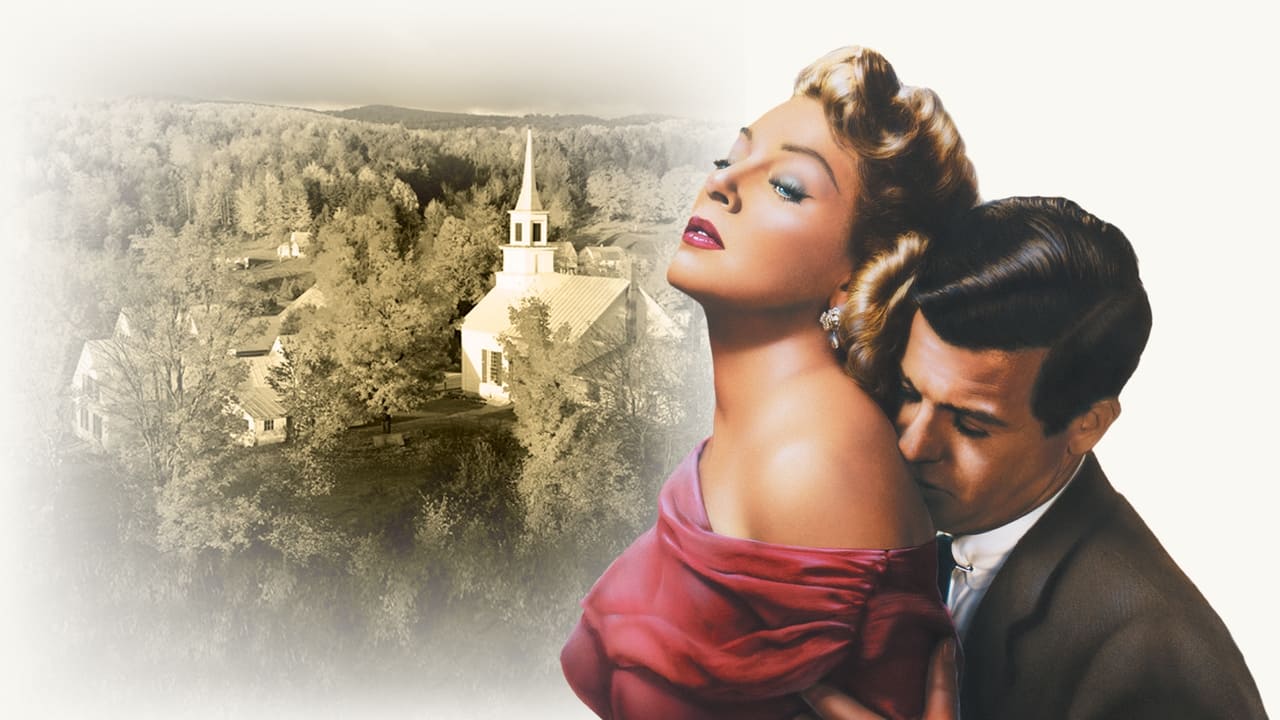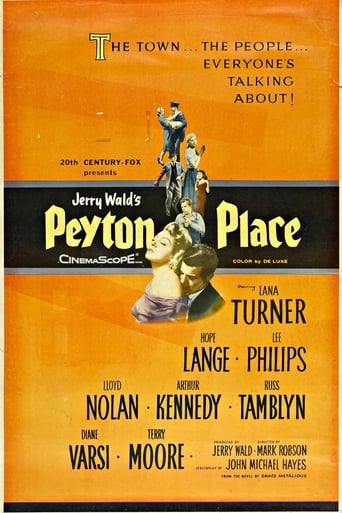

You won't be disappointed!
... View MoreIt's fun, it's light, [but] it has a hard time when its tries to get heavy.
... View Moreif their story seems completely bonkers, almost like a feverish work of fiction, you ain't heard nothing yet.
... View MoreClose shines in drama with strong language, adult themes.
... View MoreI was 10 the year this came out; I remember seeing the trailer (on TV?) and thinking it must be wonderfully salacious. Seeing it for the first time today, I can say it is wonderfully sexy, even erotic in a restrained way. The Code was weaker by the late 50's, but you still couldn't show sexual positions--Norman and Allison are vertical on that rock, not horizontal.The excitement is verbal more than physical: Cross haranguing his stepdaughter Selena, before raping her. Rossi berating Constance for her coldness to him, just after she delivers the memorable line about men always being the same at heart, even if the situation changes. Norman and Allison circle around each other coolly, as do Rodney and Betty, not wishing to commit themselves for fear of parental disapproval, which comes anyway.Lana Turner and Diane Varsi are excellent as mother and daughter. Russ Tamblyn outshines the rest of the young actors easily. I guess they couldn't get Rock Hudson for Rossi and had to settle for a nobody--it's a shame. Lloyd Nolan gives it all he's got in the courtroom scene. This is one of my favourite films from the 50's.
... View MorePeyton Place isn't really a city. It's a state of mind, set in various decades with characters in parallel universes. This explains two movies (one "Return to"), two soap operas (one "Return to") and two TV movies where characters from the first soap opera (on prime-time) long believed dead came back or had their pasts re-written for dramatic effect.The original film of "Peyton Place", though, takes place in the early 1940's in the beautiful New Hampshire town where the fall leaf changes are among the most beautiful in the country and a white church with a steeple makes it appear like a Norman Rockwell painting. But the people live more like Norman Maine or Norman Bates, their problems so deep that even people that never saw "Peyton Place" would hear someone's personal real-life soap opera and say, "That sounds like something out of Peyton Place!".Every major character in this seems to be living a lie, and so-called noble characters are judgmental hypocrites who leave Sunday church service to go to the local eatery for a gossip fest. That is except the good ole' Doc Swain (Lloyd Nolan), a noble man who knows everybody's secrets in town yet never spreads a word about anybody. Even Lucas Cross (Arthur Kennedy) gets his secrets kept, and he's guilty of raping and impregnating his step-daughter, Selena (Hope Lange).The glue of the story is Lana Turner's Constance McKenzie, a beautiful but sexually frustrated "widow" with a teenaged daughter (Diane Varsi) about to graduate from high school. There's already scandal as the film opens, and its really minor, the hiring of a newcomer to town, Michael Rossi (Lee Philips), who gets the position of principal over the beloved long-time teacher (Mildred Dunnock).This is a movie which focuses on the problems of the teenagers, all of those issues associated with something concerning their messed up parents. Wealthy Leslie Harrington (Leon Ames) dominates his son Rodney (Barry Coe), objecting to his choice of girlfriend Betty Anderson (Terry Moore), while Mrs. Evelyn Paige (Erin O'Brien-Moore) seems evident on keeping her son Norman (Russ Tamblyn) a virgin. Gossipy Marion Partridge (Peg Hillias) is the Gladys Kravitz ("Bewitched's resident gossip) of the community with her husband Charles (Staats Cotwsworth) admonishing her every time he catches her on the phone in lowered voice.In other words, this is a really screwed-up town, and like "King's Row", you expect a sign to indicate that this is a great place to raise your children. Doc Swain sees every promising high school graduate leaving as fast as they can, and that happens in droves when Pearl Harbor is bombed and the young men go off to war. Poor Selena gets the bulk of the second half of the drama with her handling of step-father Lucas. That's after her mother (Betty Field) takes the easy way out of dealing with all of the issues that have been cropping up.Lana Turner is simply the lead because she's the biggest name in the film, her on-screen footage equal to pretty much everybody else's. Still, she got a Best Actress Academy Award Nomination with a bunch of supporting performers also nominated. Overall, the cast is worthy of an ensemble award, and Turner had better performances that were totally overlooked. Among the supporting cast, Kennedy and Lange stand out, his abusive drunken father absolutely hateful but Kennedy playing him as if he was reciting Shakespeare.This is beautifully filmed, and in addition to the TV versions and movie sequels it also spawned other trashy novels to be adapted to the screen, most notably "From the Terrace", "The Best of Everything" and "Valley of the Dolls", all from 20th Century Fox. Mark Robson ("Champion") seems an odd choice to direct the epitome of a woman's flick, but since soap operas on TV were just catching on, the big screen thought it could grab into the ballgame as well. It is not a great film, but it certainly ranks as a classic, if only for the franchise that it started.
... View MoreThough set in the 1940's, teen mores of the 1950's are on dramatic display for those curious about that conformist decade. Note too, how the script talks all around the word "abortion" without ever using the word, and ditto for the word "rape". Still, it's a slickly mounted production, well-acted, and better than I expected, not having seen it for 50-some years. The 160- minute run time is off-putting, but for me the movie never dragged. Maybe that's because the major acting duties are divided between Turner, Lange, and Varsi, with the men being clearly secondary. And, of course, much time is spent on the evolving relationships, both teenage and adult.Both the book and movie were huge hits at the time, largely because the novel pushed the limits of censorship on the then delicate topic of teenage sex. Kids passed dog-eared copies around faster than answers to a physics test. Of course, the novel itself was intended as an expose of small town life in strait-laced New England, but nevertheless struck a national chord.The movie itself deals fairly effectively with teenage uncertainty and yearning, along with more adult themes of social class and children out of wedlock. One thing helping the movie's credibility is using the attractive but unHollywood looking Varsi and Lange. Even the usually flamboyant Turner is made to look and act subdued. That's okay because the topic is really the town and what it's like to grow up there. So it's no surprise that the doctor (Nolan) sternly sums up what's wrong in Peyton Place at movie's end.All in all, the movie's human interest side endures even if much of the rest stands now as little more than a cultural artifact.
... View MoreAs I read through many of the reviews here of this film I was pleased to see that it gets a pretty good rating, but disappointed at how short-sighted some are. For example -- that it's dated. Well, the film is well over 50 years old. Why wouldn't it be dated? Or that it's a soap opera or melodrama. Now, with that I really take exception, and the reason is that I grew up in a small town in the 1950s (the story takes place in the 1940s), and I could identify with most of the characters in the film. This is pretty close to how it was back then.The film is an exposé of the negative small-town attitudes so common in the USA of that era (and to some extent, still today). This particular story takes place in New England where all appears to be nearly storybook-like, while under the surface there is scandal, murder, suicide, and incest. Constance MacKenzie (played by Lana Turner) is a sexually repressed woman who raised an illegitimate child (Allison). Selena Cross (Hope Lange is being raised by an alcoholic stepfather, who rapes her, and a weak mother who hangs herself. Another character is the mama's boy Norman, played by Russ Tamblyn. Meanwhile, a new high school principal falls in love with Constance MacKenzie...and it's a rocky road. And, one of the most interesting characters is the slightly (and delightfully) crusty Dr. Matthew Swain, the town doctor, played by Lloyd Nolan. It all comes down to how to save Selena from life in prison after she murders her stepfather, who intends to rape her a second time.Lana Turner gets top billing here, although it's actually Hope Lange and Diane Varsi who really have the dominant roles. Nevertheless, Turner is very strong here, and this film helped boost a career that had sagged just a bit. Russ Tamblyn is excellent, and matures interestingly as the film progresses. This is one of Lloyd Nolan's most memorable performances; particularly noteworthy is his soliloquy in the courtroom. I feel that Arthur Kennedy -- never a favorite of mine -- deserves special recognition here. No actor really wants to play an alcoholic child-molesting practicer of incest! But he is excellent here. There are other interesting choices of actors here -- David Nelson, Leon Ames, and Lorne Greene -- not that their roles are particularly noteworthy.There are only two criticisms that I have. First, the little brother of Selena doesn't appear to age a bit over 4 or 5 years. Second, in a few scenes, particularly with Turner, she is filmed in front of a rear projection screen -- and it looks really cheesy.This movie is well worth watching...just remember that it is depicting life over 60 years ago.
... View More